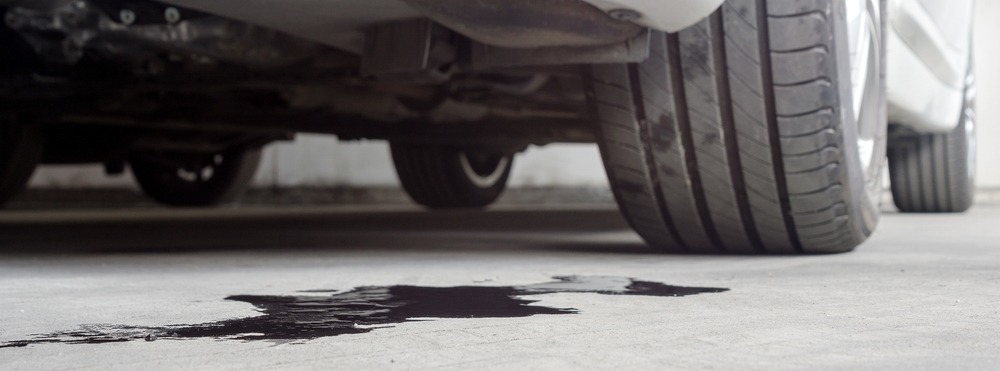
14 Sep Auto Oil Leaks? Common Causes & Solutions
 No one likes seeing those dark spots of motor oil under their cars. Our busy schedules rarely leave us extra time for auto maintenance. However, you should always prioritized auto oil leaks. Low engine oil / motor oil can be remedied by following factory-suggested oil change intervals. Continue reading for valuable info on spotting common causes of auto oil leaks and solutions.
No one likes seeing those dark spots of motor oil under their cars. Our busy schedules rarely leave us extra time for auto maintenance. However, you should always prioritized auto oil leaks. Low engine oil / motor oil can be remedied by following factory-suggested oil change intervals. Continue reading for valuable info on spotting common causes of auto oil leaks and solutions.
Locating & Fixing Auto Oil Leaks
While not every vehicle is manufactured the same way or uses the same components, there are similarities. All combustion engines use common parts dealing with motor oil transfer, filtering, and lubrication. These parts all have similar common failings.
Loose Oil Fill Cap or Dipstick
An old or loose oil fill cap can allow oil to seep from the reservoir. An oil dipstick that is seated improperly can jiggle around, creating oil leaks. These are super easy to inspect yourself and also easy to fix.
- When the oil fill cap is old, cracked, or has a worn seal, purchase a replacement cap at any auto parts store. Have the clerk help you look up the correct part for your vehicle make, model, and year (since one size does NOT fit all).
- A loose dipstick may simply need to be removed, wiped clean, and fully reinserted. The handle should have a small O-ring gasket, which can degrade over time. If this occurs purchase a replacement. In addition, if the plastic pull cap breaks, purchase a replacement dipstick.
Clogged Oil Filter
A clogged or defective oil filter can cause auto oil leaks. If installed too tightly, you may also see motor oil seeping from the gasket or the O-ring.
- If the oil filter is causing your leak, schedule an oil change service to have it replaced. Factory specs recommend changing your motor oil and oil filter simultaneously.
Faulty Oil Pressure Sensor
A faulty oil pressure sensor may trigger the Low Oil light on your dashboard. Excess oil pressure from the oil pump may cause oil leakage around the sensor housing if the sensor malfunctions.
- If you suspect a faulty oil pressure sensor, schedule a diagnostic service as soon as possible to prevent engine damage.
Damaged Drain Plug
During an oil change service, the technician removes the drain plug and completely empties the old oil. Over time, the plug and its inner seal can become worn or damaged, causing auto oil leaks. A loose plug can also lead to leaks.
- Purchasing a replacement drain plug (and inner seal) is pretty straightforward. Most auto part stores can help you find the correct replacement part. However, replacing the plug does require draining the engine oil. If the oil leak is minor, let a service technician replace it during your next oil change.
Leaking Oil Pan
Depending on your vehicle, the oil pan may be steel, aluminum, or reinforced plastic. Steel oil pans can rust, causing engine oil to leak through compromised areas. Road debris or auto collisions can damage oil pans. Any minor crack or hole can result in motor oil leakage. Auto manufacturers do not recommend driving with a damaged oil pan.
- Oil pan replacement is a messy job. Depending on your vehicle, the engine may need to be pulled to access the oil pan. If you are not an experienced mechanic, this job may be best for a certified technician.
Worn Gaskets & Seals
Oil Pan Gasket: This gasket seals the connection between the oil pan and the engine block. It is subjected to a great deal of pressure and high heat.
- Eventually, the oil pan gasket will degrade. Once it starts leaking engine oil, it must be replaced with a new one.
Valve Cover Gasket: The valve cover is located above the cylinder head. The valve cover gasket seals the two components together. It keeps the oil trapped inside the engine to circulate and lubricate the engine components continuously. Your vehicle can have one or two valve cover gaskets. They come in three material types: cork, rubber, and silicone.
- Worn or damaged seals must be replaced. Only use the replacement type specified by the manufacturer for your vehicle.
Oil Change Intervals
Fresh oil will keep your engine running clean and efficient. Keeping current on your recommended oil changes can spot auto oil leaks and help you save money on gas. The rule of thumb used to be every 3 months or 3,000 miles. But modern vehicles and better motor oil can go longer and farther between oil changes. Stick to what your owner’s manual suggests, and if your Check Oil light comes on in your dash, get it serviced right away.
JJ’s Auto Care In Jacksonville, FL
Since 1991, JJ’s Auto Care, a family-owned and operated company, has earned the Blue Seal of Excellence from the Automotive Service Excellence. Count on us to provide quality assistance for all your Auto Maintenance, Service, and Repair needs.
Schedule Service for Auto Oil Leaks
Call JJ Auto Care at (904) 721-6646 or visit us online to schedule a diagnostic engine oil service appointment today!

